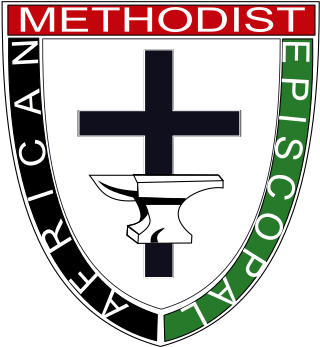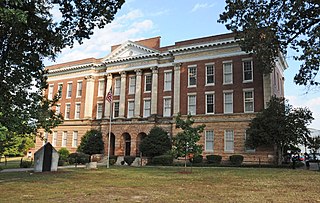
Isaac Lane (1834–1937) was an American bishop and educator. He was the fifth bishop of the Colored Methodist Episcopal Church in America. Lane College, established in 1882 in Jackson, Tennessee college was named after Lane. [1]

Isaac Lane (1834–1937) was an American bishop and educator. He was the fifth bishop of the Colored Methodist Episcopal Church in America. Lane College, established in 1882 in Jackson, Tennessee college was named after Lane. [1]
Isaac Lane was born March 4, 1834, in Madison County, Tennessee. Lane was born a slave on the plantation of Cullen Lane. [2] At age nineteen Lane married Frances Ann Boyce, also a slave, but from Haywood County. The Lanes had eleven children and several became ministers, educators, and physicians. [3]
In 1870 after freed slaves founded the Colored Methodist Episcopal Church (CME), Lane quickly became a popular minister of the denomination, and in 1873, he was elected as a bishop by the 2nd General Conference of the Christian Methodist Episcopal Church, called together for the purpose of electing a bishop after the death of Bishop Richard Vanderhorst.
In 1882 Lane founded a Colored Methodist Episcopal Church (CME) school in Jackson, and Lane's daughter, Jennie Lane, served as the first teacher and principal of the institution. In preparation for petitioning for the school to gain college status, Lane selected a white Methodist pastor, Thomas F. Saunders, as the first president of the college to ease the process of peer recognition of the school.
In 1907, Lane's son, James Franklin Lane, Ph.D. was chosen as president of Lane College and he served for thirty-seven years. [4]
In 1937, Bishop Lane died at the age of 102. [5] [6] He is buried at Riverside Cemetery in Jackson, Tennessee, U.S..
In addition to Lane College, a Merchant Marine Victory ship was named in Lane's honor during World War II. The SS Lane Victory is still afloat in San Pedro, California as a museum ship.
The Methodist Episcopal Church, South was the American Methodist denomination resulting from the 19th-century split over the issue of slavery in the Methodist Episcopal Church (MEC). Disagreement on this issue had been increasing in strength for decades between churches of the Northern and Southern United States; in 1845 it resulted in a schism at the General Conference of the MEC held in Louisville, Kentucky.

The African Methodist Episcopal Church, usually called the AME Church or AME, is a Methodist Black church. It adheres to Wesleyan-Arminian theology and has a connexional polity. The first independent Protestant denomination to be founded by Black people, AME welcomes and has members of all ethnicities.

The Christian Methodist Episcopal (C.M.E.) Church is a historically black denomination that branched from earlier Methodist groups in the United States. It is considered to be a mainline denomination. The CME Church was organized on December 16, 1870, in Jackson, Tennessee, by 41 former enslaved congregants with the full support of their white sponsors in their former Methodist Episcopal Church, South who met to form an organization that would allow them to establish and maintain their own polity. They ordained their own bishops and ministers without their being officially endorsed or appointed by the white-dominated body. They called this fellowship the Colored Methodist Episcopal Church in America, which it remained until their successors adopted the current name in 1954. The Christian Methodist Episcopal today has a church membership of people from all racial backgrounds. It adheres to Wesleyan-Arminian theology.

Lane College is a private historically black college associated with the Christian Methodist Episcopal Church and located in Jackson, Tennessee. It offers associate and baccalaureate degrees in the arts and sciences.

Mount Olivet Cemetery is a 206-acre (83 ha) cemetery located in Nashville, Tennessee. It is located approximately two miles East of downtown Nashville, and adjacent to the Catholic Calvary Cemetery. It is open to the public during daylight hours.

Texas College is a private, historically black Christian Methodist Episcopal college in Tyler, Texas. It is affiliated with the United Negro College Fund. It was founded in 1894 by a group of ministers affiliated with the Christian Methodist Episcopal (CME) Church, a predominantly black denomination which was at the time known as the Colored Methodist Episcopal Church in America. They planned to provide for education of African-American students, who were excluded from the segregated university system of Texas. They planned a full literary, scientific and classical education for theology, normal training of lower school teachers, music, commercial and industrial training, and agricultural and mechanical sciences.

Warren Akin Candler was an American bishop of the Methodist Episcopal Church, South, elected in 1898. He was the tenth president of Emory University.

James Osgood Andrew was elected in 1832 an American bishop of the Methodist Episcopal Church. After the split within the church in 1844, he continued as a bishop in the Methodist Episcopal Church, South.

William Henry (Harrison) Heard was a clergyman of the African Methodist Episcopal Church who served as United States Ambassador to Liberia from 1895 through 1898.
Riverside Cemetery is a cemetery located in Jackson, Tennessee. It is located few blocks south of the Madison County Courthouse, separated from Riverside Drive by a five-foot-high red brick wall. Riverside Cemetery was listed in the National Register of Historic Places on 9 May 2003.

Mississippi Industrial College was a historically black college in Holly Springs, Mississippi. It was founded in 1905 by the Mississippi Conference of the Colored Methodist Episcopal Church. After desegregation of community colleges in the mid-20th century, it had trouble competing and eventually closed in 1982. The campus was listed as a historic site on the National Register of Historic Places in 1980 and was acquired by Rust College in 2008.

Charles Spencer Smith (1852–1923) was a Methodist minister and afterwards bishop of the African Methodist Episcopal Church as well as an Alabama state legislator. He wrote numerous pamphlets during his lifetime, as well as a history of the AME Church and Glimpses of Africa (1895) chronicling his 1894 trip to the African continent.
Bishop William May Wightman (1808–1882) was an American educator and clergyman. He served as the President of Wofford College from 1853 to 1859. He served as the Chancellor of Southern University in Greensboro, Alabama from 1860 to 1866. He became a Bishop of the Methodist Episcopal Church, South in 1866.
Helena B. Cobb was an American educator and missionary from Georgia. Born in Monroe County, Georgia, she attended Atlanta University and served as an educator and principal at many schools for African Americans in the state. She was also active in organizing and pushing for greater missionary opportunities for women within the Colored Methodist Episcopal Church.
The Lane Dragons football program of Jackson, Tennessee competes in Division II of the NCAA as a member of the Southern Intercollegiate Athletic Conference. They are led by head coach Vyron Brown, a former Grambling State University player and offensive coordinator.

Lucius Henry Holsey was an American bishop.
Haygood Seminary, also known as Haygood Academy, was a seminary near Washington, Arkansas, United States. It was established by the Colored Methodist Episcopal Church to train African Americans in Arkansas for a career in the clergy. It was one of the first such institutions established by the CME Church. In 1927, the school relocated to Jefferson County, Arkansas, where it operated as Arkansas-Haygood Industrial College before closing during World War II.

Homer College, formerly Homer Seminary, was a private Methodist school in Homer, Louisiana. In 1880 a school was opened under the name "Homer Seminary" as an African American elementary and high school founded by members of the Colored Methodist Episcopal Church ; by 1910 the school was renamed Homer College and became part of the CME, it served as an African American college-preparatory school for Texas College in Tyler, Texas. The school closed in 1918 after a conflict of leadership.

Rev. James Albert Bray (1870–1944) was an American bishop, educator, academic administrator, and college president. He was the 18th bishop of the Colored Methodist Episcopal Church, elected in 1934. Bray served as president of Lane College, and Miles Memorial College, two private historically black colleges affiliated with the CME Church.

James Franklin Lane (1874–1944) was an American educator and college president. For 37 years, he served as the third president of Lane College, a private historically black college located in Jackson, Tennessee. He was the son of bishop Isaac Lane, the namesake of Lane College.